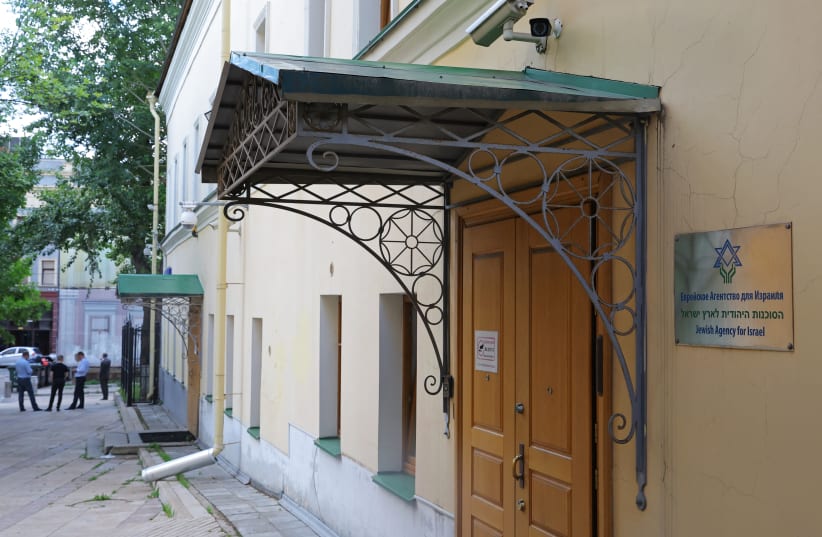Israel is prepared for a dialogue about Russia’s crackdown on the Jewish Agency, Prime Minister Yair Lapid said Tuesday.
“Israel-Russia relations lean on history, continuous contact and shared interests,” he said. “The Jewish community plays a central role in these relations.”
Responding to Kremlin spokesman Dmitry Peskov’s statement that Russia has legal questions about the Jewish Agency that are not related to bilateral relations, Lapid said Israel is ready to talk.
“If there are indeed legal matters that arise from the Jewish Agency’s important activities in Russia, Israel, as always, is prepared to hold a dialogue while preserving the important interests of the countries,” he said.
Earlier in the week, Lapid said if the Jewish Agency were closed in Russia, it would be “a serious matter with ramifications for relations” between the countries.
Jerusalem views the crackdown on the Jewish Agency as diplomatic and a possible reaction to Israeli humanitarian aid to Ukraine – more of which was dispatched on Monday. It may also have been a reaction to Lapid’s criticism of Russia’s invasion and Israel’s votes in the UN, though Israel has not given Ukraine military aid.
Moscow on Tuesday seemed eager to downplay the diplomatic implications.
“There is no need to politicize this situation and project it onto the entire range of Russian-Israeli relations,” Peskov said.
“It’s necessary to take a careful approach here, but also to realize that all organizations must comply with Russian law,” he said.
Russian Foreign Ministry spokeswoman Maria Zakharova said: “This is a question of the Ministry of Justice. This is a legal plane.”
“Unfortunately, in recent months we have heard… absolutely unconstructive and, most importantly, biased rhetoric,” she said.
“It was completely incomprehensible and strange for us,” Zakharova said. “When we now hear comments from the leadership of this country that some of Russia’s actions on the bilateral track may affect relations, I would like to ask if these same people do not think that their actions and statements over these months have already affected bilateral relations.”
Jewish Agency employees in Russia complained about phone tapping in recent days, amid a crackdown on the organization and a spike of about 1,000 applications a day from Russian Jews seeking to move to Israel.
In recent calls from their Moscow office, Russian intelligence personnel interrupted their conversations to accuse them of breaking privacy laws, the employees said.
The number of aliyah applicants has more than doubled in recent weeks, following an increase that began after Russia invaded Ukraine at the end of February, according to Jewish Agency officials.
In addition, about 60% of Jewish Agency employees remain at the five offices of the organization across Russia, after many of them left for Israel.
Nearly 20,000 Russian Jews and 16,000 Ukrainian Jews have made aliyah since February.
According to Nativ, an independent administrative unit in the Prime Minister’s Office that operates among Jews and their families throughout the FSU countries, about 35,000 Russian Jews have filled out forms and are waiting to make aliyah.
“Every day, 1,000 new applicants arrive at the Jewish Agency offices across Russia,” a person familiar with the matter said.
The Jewish Agency has also received alarming reports of Russian Jews waiting to make aliyah who have received threats from Russian banks, Army Radio reported. The banks told them if they immigrate, they would lose basic rights in Russia, such as owning a bank account, and they will forfeit their assets and savings, the report said.
Russia's Jewish Agency problems
Moscow says its actions against the Jewish Agency are a purely legal matter, while criticizing Israel’s position toward Russia in the war with Ukraine.
The Russian Justice Ministry began to probe the Jewish Agency about three years ago, amid a crackdown on foreign NGOs, and intensified its scrutiny earlier this month. The Jewish Agency, which coordinates efforts for Diaspora Jews to make aliyah, took steps in recent days to move its Russian operations to Israel and online. Other Jewish NGOs in Russia have received letters from the authorities as well.
The Jewish Agency is expected to respond to allegations by the Russian Justice Ministry in a court session this Thursday in Moscow. According to the Russian Justice Ministry, the Jewish Agency had violated Russian privacy laws and therefore should be categorized as a “foreign agent,” a category that can carry a prison sentence of seven years.
Israel organized a delegation from the Foreign Ministry and the National Security Council, together with other legal experts, last week to speak with Russian authorities in Moscow about the issue, but Russia has yet to grant them a visa.
President Isaac Herzog, a former chairman of the Jewish Agency, on Tuesday said the topic was close to his heart. Nevertheless, “the less we talk, the better, which will allow us to handle the matter better,” he said at a Channel 13 conference.
Herzog warned against speculation.
“Russia is an important country… and there are different scenarios and reasons for why this event developed,” he said. “I prefer not to get into analyses… Let’s let the processes happen. The less we talk, the better.”
Opposition leader Benjamin Netanyahu on Tuesday said Israel-Russia relations were “in a dangerous crisis” that must be brought to an end or risk Israel’s national security.”
“For years, we led a relationship with Russia that was measured, balanced and responsible,” he said. “In recent days, I am worried that what we built over the years is being undermined... It is happening because of a combination of amateurism, irresponsibility and arrogance.”
Netanyahu called on Lapid and Defense Minister Benny Gantz to “stop chattering. Your behavior is endangering our national security.”
“Russia is an important country and there are different scenarios and reasons for why this event developed."
President Isaac Herzog
Former Jewish Agency chairman Ze’ev Bielski told Army Radio the situation in Russia was “a return to the period of the Iron Curtain.”
“If, indeed, the reports coming from Russia are true, and the authorities are causing difficulties to Jews who expressed their desire to immigrate to Israel, we are in a very serious situation that we have not seen for decades,” he said.
“Here in Israel, we have established a home for every Jew,” Bielski said. “Therefore, if this indeed happens, the State of Israel will not be able to remain silent.”

